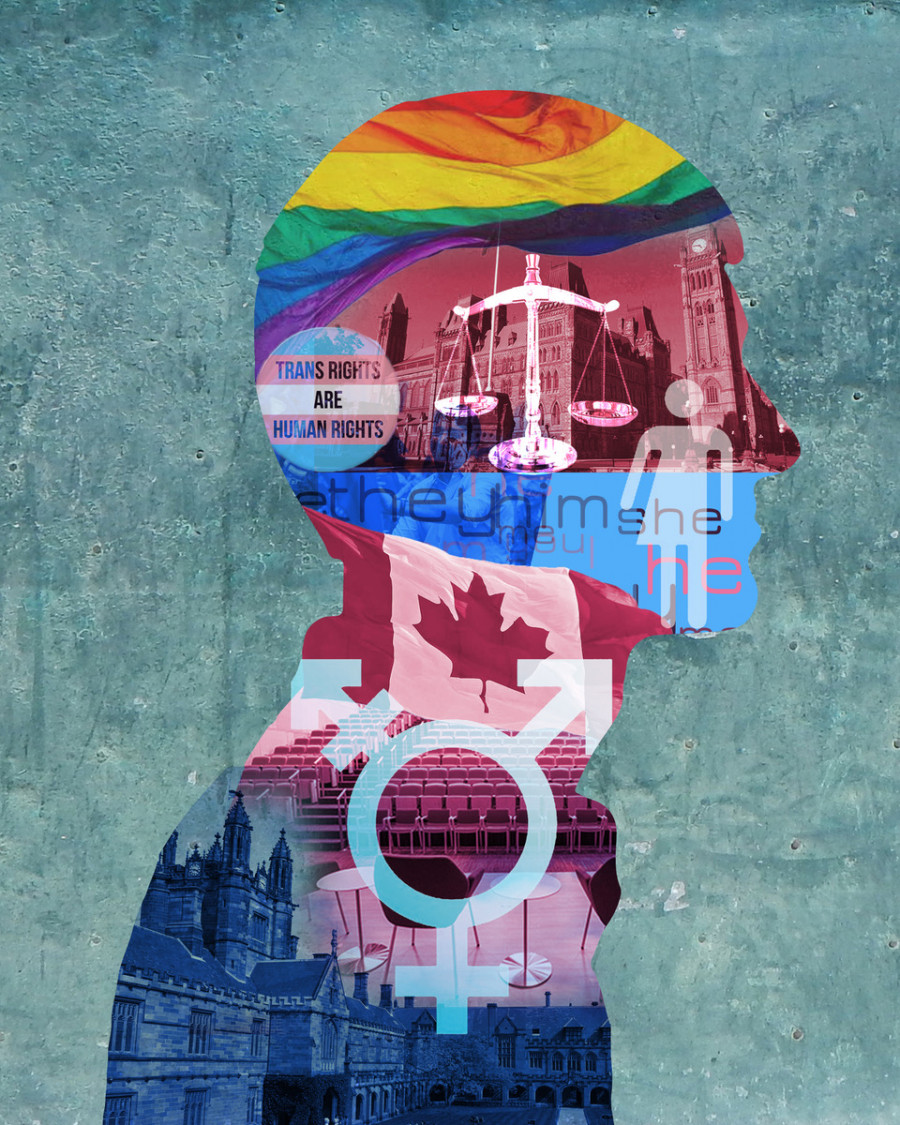Quebec’s trans community maintains unified stance against Bill 2
Almost six months after the introduction of Bill 2, trans activists continue fighting for their rights
When Bill 2 was first presented to the public in October 2021, the entire trans community was shocked, according to Gabriel Galantino, research coordinator for Chaire de recherche sur la diversité sexuelle et la pluralité des genres at l’Université du Québec à Montréal.
Bill 2 introduces the legal notion of gender, which is differentiated from sex, brings back surgical requirements to legally transition, and creates an undefined category of “biological sex.” As Judith Lefebvre, a librarian at the feminist bookstore l’Euguélionne, mentioned, “biological sex” is a term only used by trans-exclusionary radical feminist circles, so she wonders how it got into legislation.
“It’s so disheartening to have to fight to not lose rights when we face so many other challenges against which we have to fight to win rights,” she said.
“I was primarily devastated,” Galantino said about when Bill 2 was first announced. “Even as a person who had already legally transitioned, it really floored me.”
He added that Bill 2 is a major regression in terms of trans rights, as the surgical requirement it imposes on trans people who wish to legally transition is an unprecedented barrier.
“It’s downright dehumanizing,” he said.
A major question the trans community had regarding Bill 2, explained Galantino, was whether it was intentionally malicious, or simply a very ignorant but well-intentioned way to address the January 2021 court ruling in favour of the Centre for Gender Advocacy.
Lefebvre explained the ruling’s three main points were that non-citizens must have equal access to legal transitioning services, non-binary people must have a legal option that corresponds to their gender identity, and youth who are 14 and over should no longer need medical consent to transition since they already have medical autonomy.
However, according to Lefebvre, Bill 2 doesn’t address the court ruling at all. “We would basically have to beat this bill [in court] to present a new one. If they don’t modify it substantially, it’s of no use to us,” she said.
“[This bill] will destroy lives,” Galantino said in regards to trans youth, who may be faced with the choice of either modifying their bodies in ways they may not want to or be deprived of legal transitioning.
“I was thinking a lot about the young generation who would have to face this new law and I thought it was just horrible,” he said. “It will kill people.”
Johnny Boivin, a research technician and co-facilitator for a research project on Indigenous two-spirited and trans youth, mentioned how the health system is already discriminatory when it comes to gender-affirming surgeries. For him, Bill 2 is worrisome because there are still lots of unknowns surrounding the bill.
“If the bill passes, it will bring about a higher risk of discrimination in a system that is already difficult to navigate,” he said.
Bill 2, if passed, could out trans people every time they show their ID, as it creates a distinction between gender identity and sex.
Boivin added the bill is especially dangerous for closeted trans youth, for whom having this proof of transition would be especially exposing.
He explained how the trans youth he works with are already a marginalized group because they are Indigenous. Racism and queerphobia, according to him, add layers of risk for discrimination against this population.
Since this population is marginalized twice, they already have a harder time getting professional help when they need it, mentioned Boivin. “I’ve also had disgusting experiences in psychiatry that didn’t need to happen,” he said.
He emphasized that adding Bill 2 to legislation will add even more barriers for Indigenous trans youth seeking mental and medical support. There is a lot of mistrust in the medical system among this population, Boivin said, and getting surgeries is already a very lengthy process requiring reference letters.
“It’s a process that also has a negative effect on mental health because it requires having to prove one’s gender and one’s identity instead of simply being able to be and to live [as your gender],” he added.
According to Boivin, Bill 2 would just render even more inaccessible a healthcare system where trans youth already face challenges in accessing therapy, hormone prescriptions, and surgeries.
“Access to the healthcare system is already very difficult, so adding a law like this one would be simply putting even more sticks in the wheels,” he said.
“I think for projects like these, it should be the LGBTQ[A+] community that makes these decisions for their own protection,” Boivin added, a sentiment echoed by Lefebvre and Galantino.
On a more positive note, Galantino is proud of the trans community’s strong, unified mobilization against Bill 2. He asserted the community members’ responses to the transphobic bill were very organized and in his opinion, their voices have been heard.
For example, in October 2021, the trans community sent a petition to the National Assembly denouncing Bill 2. This petition was entirely written by Celeste Trianon, the trans advocate for the Centre for Gender Advocacy, who has been actively fighting against Bill 2 ever since.
Trianon is still waiting to see if their petition has been successful or not. She is starting to feel more optimistic after Jolin-Barrette voted in favour of a motion on Trans Day of Visibility on March 31st.
“I’ll only know for sure [if the petition is successful] once the amendments have been presented [in court],” they said.
Similarly, Boivin agreed the backlash the bill received from the general public, along with letters sent to the government in opposition to the bill, will hopefully lead to judicial opposition to the bill.
“Our message is clear,” said Ariane Marchand-Labelle, executive director of LGBT rights group Conseil Québécois LGBT. “[T]he minister [of justice,] Simon Jolin-Barette needs to go back to the drawing board with the trans, non-binary and intersex communities and get back to work.”
She said that Conseil Québécois LGBT is following very closely the legislative process, but the government is “leaving thousands of people in uncertainty regarding their transition while their mental and physical health depend on it.”






